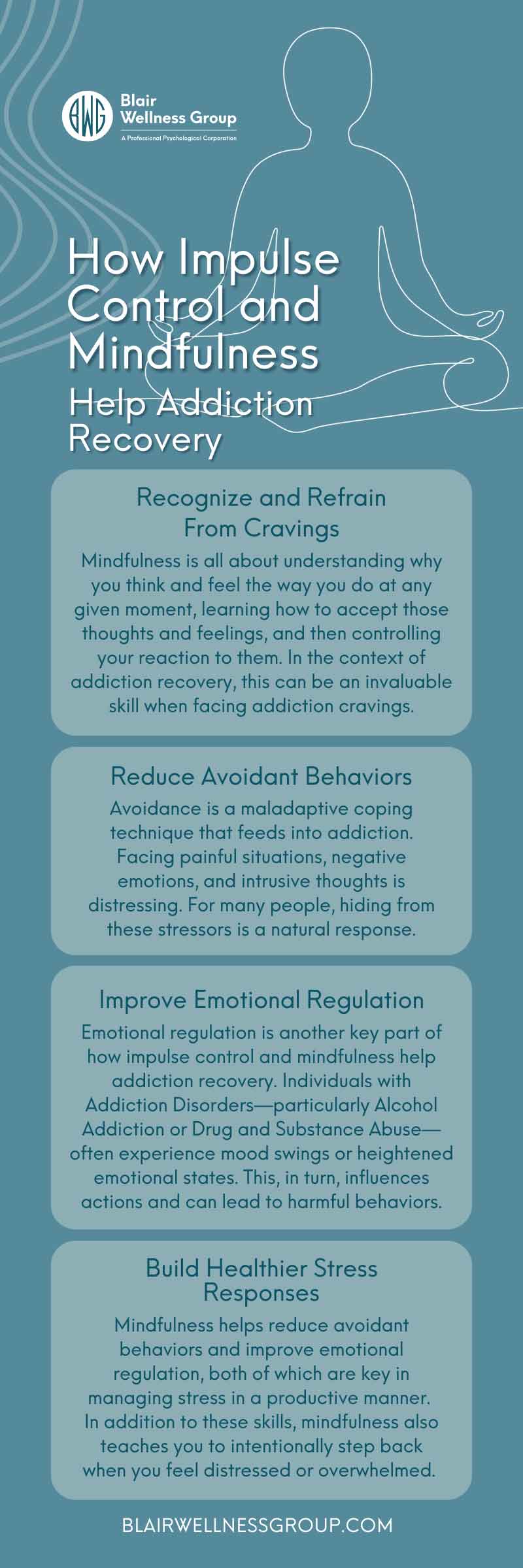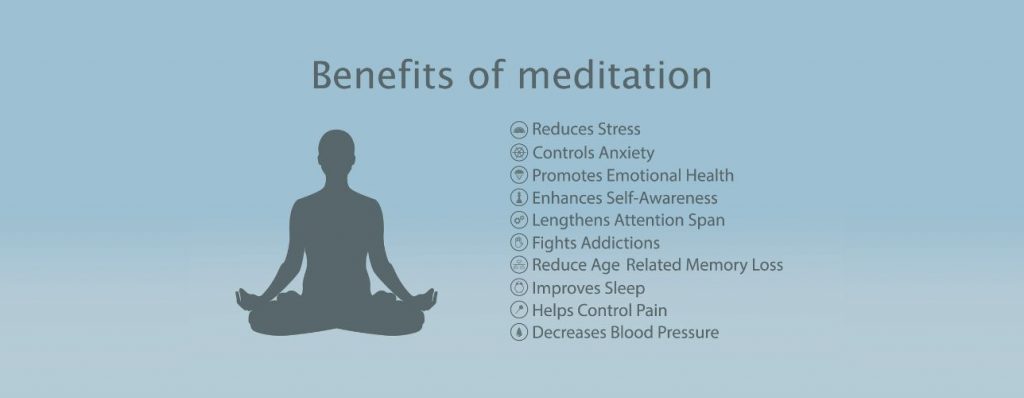Drug and Substance Abuse, Alcohol Addiction, and other Addiction Disorders affect the way you feel, think, and act. In addition to experiencing strong cravings for their addictive substance or behavior, individuals with Addiction Disorders also face immense feelings of guilt or shame, low self-esteem, poor stress management skills, and other unhealthy thoughts or behaviors.
These challenges make it harder to seek help and build healthy coping mechanisms, thus encouraging individuals to keep turning to their addictive behaviors to deal with hardship and distress. This is how Addiction Disorders create a vicious and unhealthy cycle that, in time, can take over your entire life.
It does not have to be this way, though. There are many treatment approaches to help addiction recovery. Among them is mindfulness. Using mindfulness as a tool—alongside evidence-based therapies and other treatments—helps you learn better impulse control, develop healthier emotional responses, and improve your overall state of mind. Discover how impulse control and mindfulness help addiction recovery.
Understand the Importance of Impulse Control and Mindfulness
On the surface, mindfulness is a straightforward practice; it involves focusing on the present to develop a greater awareness of what is happening in the moment. Being mindful means being aware of the things you are feeling both physically and emotionally. This helps you better understand the underlying thoughts and emotions you have at any moment. Moreover, mindfulness teaches you to take note of thoughts and feelings without necessarily acting on them. This helps you avoid impulsive actions while also lessening the impact of negative thoughts and emotions.
Using mindfulness as part of professional mental health treatment has many benefits. It helps reduce anxiety and stress and teaches patients how to navigate intense feelings without becoming overwhelmed. It also improves awareness, which in turn promotes greater reflection and insight into your own emotions and thought patterns, as well as the behaviors that stem from them.
Recognize and Refrain From Cravings
Mindfulness is all about understanding why you think and feel the way you do at any given moment, learning how to accept those thoughts and feelings, and then controlling your reaction to them. In the context of addiction recovery, this can be an invaluable skill when facing addiction cravings.
For example, someone with an Alcohol Addiction will crave a drink, then act on that craving impulsively by grabbing a beer. With mindfulness skills, however, that same person will stop themselves from acting impulsively and instead stop and take stock of the situation. They will recognize their craving for what it is and acknowledge where it comes from or why it occurs. This, in turn, helps them identify the underlying cause of their craving, which might be stress, anxiety, frustration, or other negative emotions. But instead of dealing with that distress by relapsing, they will have a levelheaded, healthy response to their craving.
In addition to promoting impulse control and helping individuals refrain from acting upon addiction cravings, mindfulness creates a sense of empowerment. By facing challenges and reacting to them in a healthy manner, individuals feel more confident and in control of their situation. This sense of accomplishment can be another powerful tool in addiction recovery.
Reduce Avoidant Behaviors
Avoidance is a maladaptive coping technique that feeds into addiction. Facing painful situations, negative emotions, and intrusive thoughts is distressing. For many people, hiding from these stressors is a natural response. In many cases, addictive substances and behaviors are a way to avoid the discomfort and pain of these stressors.
Mindfulness helps reduce avoidant behavior by giving you a way to experience negative situations without becoming overwhelmed. This promotes emotional resilience and teaches you to accept negative emotions and thoughts without fear or judgment. When you do not feel the urge to shy away from stress or pain, you learn to tolerate distress without the help of substance use or other addictive behaviors.
Improve Emotional Regulation
Emotional regulation is another key part of how impulse control and mindfulness help addiction recovery. Individuals with Addiction Disorders—particularly Alcohol Addiction or Drug and Substance Abuse—often experience mood swings or heightened emotional states. This, in turn, influences actions and can lead to harmful behaviors.
Emotional regulation teaches you to understand and manage your own emotional responses so that you can avoid these irrational thoughts and behaviors. With emotional regulation, you develop skills like the ability to defuse conflict, manage stress, face challenges, and maintain strong relationships. These skills help decrease your need to turn to harmful and addictive behaviors in the face of stress or negativity.
Build Healthier Stress Responses
Unhealthy stress responses often feed into addiction. Addictive behaviors are maladaptive coping techniques; they might provide temporary relief from pain or stress, but they ultimately cause even more hardship for you down the line.
Mindfulness provides individuals recovering from Addiction Disorders a healthier way to handle negativity or distress. As previously mentioned, mindfulness helps reduce avoidant behaviors and improve emotional regulation, both of which are key in managing stress in a productive manner. In addition to these skills, mindfulness also teaches you to intentionally step back when you feel distressed or overwhelmed. By slowing down and reviewing your own thoughts and emotions, you can overcome tension and help your body and mind relax. This makes it easier to avoid impulsive or dangerous actions that you might crave in response to stress.
Promote Self-Compassion
Mindfulness promotes self-awareness, which in turn promotes self-compassion. When you can think clearly about your own negative thoughts, emotions, and behaviors, you become more understanding of why you feel and act the way you do.
This mental and emotional clarity combats the harmful self-criticism and judgment that come with an Addiction Disorder. When you can accept and explore your negative experiences, you can overcome the feelings of guilt or shame that would otherwise accompany them. This allows you to see yourself in a more compassionate light as you work through the challenges of your Addiction Disorder. By treating yourself with more understanding and positivity, you can manage negativity, celebrate progress, and build a healthier mindset that will serve you throughout your addiction recovery.
Addiction Recovery at Blair Wellness Group
Working with a Licensed Clinical Psychologist helps you learn mindfulness, emotional regulation, stress management, and other key skills that will assist you as you face and overcome your Addiction Disorder. If you need substance abuse therapy in Orange County, turn to Blair Wellness Group. Our compassionate approach to treatment uses mindfulness within evidence-based therapies, such as Cognitive Behavioral Therapy, Dialectical Behavioral Therapy, and Acceptance and Commitment Therapy. Begin your journey to recovery with Blair Wellness Group today.















